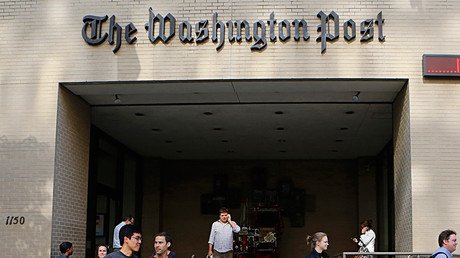Washington Post latest blunder proves fake news is fine... if it involves Russia

It was well established in 2016 that most things that go wrong in the world are Russia’s fault — but last week the Washington Post decided to really close the year out with a bang.
The Post, which openly aspires to become the “new paper of record,” published a story claiming that Russian hackers penetrated the US power grid through a utility in Vermont.
There was no ambiguity whatsoever in the headline. Russian hackers penetrated a US electricity grid, according to officials. Scary stuff, right? The only problem was, the central claim of the story was entirely made up.
In a deconstruction of the Post’s piece for The Intercept, Glenn Greenwald clarified the most basic facts, which the Post’s journalists and editors somehow failed to do: There was no Russian penetration of the US power grid. In fact, there was no penetration of the US power grid at all.
Burlington Electric public utility received a standard notice (sent to all utility companies) about a malware code which had also been found in the Democratic National Committee system (also reportedly hacked by the Russians).
Burlington Electric then searched its computers and found the code in one laptop which was not connected to the power grid. And that’s pretty much it.
According to Greenwald, the Post journalists didn’t even perform their most basic duty to contact the company before publishing their alarmist article, forcing the company to later issue its own statement clarifying what had happened— or, technically, what had not happened.
1) Not an infiltration of the power grid.
— Dell Cameron (@dellcam) 31 декабря 2016 г.
2) "Russian" malware can be purchased online by anyone.
3) See 1 & 2. https://t.co/bVIG8zQBsk
"Media reports stating that Burlington Electric was hacked or that the electric grid was breached are false," the company said on its website.
But by then the fake story was already out there. Other outlets had picked the news up and enthusiastically repeated the latest claims of evil Russian meddling. Politicians made dramatic statements about how there must be a response to such grievous Russian interference.
Vermont’s governor for example, issued a restrained and careful statement telling “Vermonters and all Americans” they should be “alarmed and outraged” to have one of the world’s “leading thugs” Vladimir Putin hacking into their electricity grid.
Eventually the Post attached a correction to the top of their story, which reads: “An earlier version of this story incorrectly said that Russian hackers had penetrated the U.S. electric grid. Authorities say there is no indication of that so far. The computer at Burlington Electric that was hacked was not attached to the grid.”
That at least clears up the fact that their central piece of ‘news’ was a lie, but the headline on the Post’s piece still dramatically claims that a “Russian operation” was responsible for the hacking.
In fact, there is no evidence to suggest that a “Russian operation” was responsible for infecting the laptop. Yes, the malware was “Russian-made” but that doesn’t mean “the Russians” used it.
Malware can be bought and sold by anyone — and as Greenwald points out, assuming the users in this instance were Russian would be like finding a Kalashnikov at a murder scene and assuming the killer was Russian. That would be a pretty irresponsible claim to make — and so were the Post’s claims, but we’re apparently living in a media environment that permits the publishing of any absurdity so long as “the Russians” come out looking evil.
How does this happen? How is it taken so lightly in a media environment that is apparently obsessed with the perils of “fake news” distorting reality? Publishing outrageous claims about Russia — which later turn out to be false or evidence-less — is becoming something of a habit for Western journalists. To compound the problem, there is practically no comeuppance when they get something wrong, either by negligence or intention.
Once the story is out there it grows legs and thousands of people —hundreds of thousands even — believe it before the offending publication ever slaps a by-then useless correction onto it. This is exactly how fake news spreads regardless of who is spreading it.
It doesn’t matter if it’s a pro-Trump fake news operation run by Moldovan teenagers or if it’s the Washington Post. It happens the same way. The difference is that journalists at the Washington Post are supposed to be held to some basic journalistic standards. In this case, a simple call to Burlington Electric would have saved them considerable time and embarrassment.
If you questioned @WashingtonPost's fake story on Russia hacking US power grids, you're a "Russia apologist" says @Newsweek. Happy 2017! pic.twitter.com/EDFPmxiboN
— Danielle Ryan (@DanielleRyanJ) 31 декабря 2016 г.
Maybe even as bad as the story itself was some of the reaction. In a piece covering the controversy, instead of criticizing the Post’s fear-mongering article, one Newsweek journalist called those who questioned the false claims “Russia apologists”.
Worse still, the author suggested the skepticism surrounding the story could have been Donald Trump’s fault because he has refused to blame Russia for the hacks/leaks at the DNC. But the skepticism surrounding the story existed because it was untrue and it has nothing whatsoever to do with the author’s desire to insert a bit of superfluous Trump bashing into his piece.
The piece went on to admit the Washington Post “went too far in its reporting,” which is an odd way of saying the Post made stuff up and published it. The author also admitted that Greenwald raised “fair and important criticisms” about the Post, but questioned his motivations by pointing out that he has been skeptical of other Russia hacking stories too, as if that somehow invalidates his current skepticism.
In other words, the Newsweek piece was one step away from calling Greenwald himself a Kremlin agent.
The author ends on a pessimistic note, worrying that in the current media and political climate, “snide Russia apologists” are unlikely to “retreat” any time soon, continuing to lay the greater portion of his criticisms on those who were right (the Russia “apologists”) rather than those who were wrong (the Post’s journalists).
The Post’s story did have one good use, however. It was perhaps the best and clearest indication yet of just how little time and effort goes into much mainstream US media reporting when Russia is the subject.
Journalists who care more about facts than propelling and compounding easy narratives should take heed and treat the Post’s latest mistake as a cautionary tale.
The statements, views and opinions expressed in this column are solely those of the author and do not necessarily represent those of RT.














